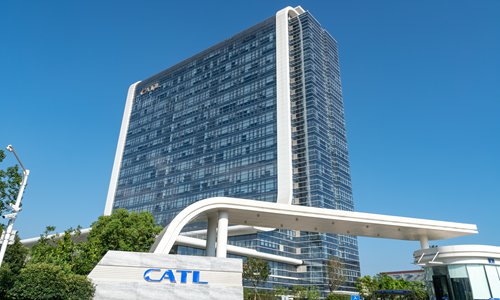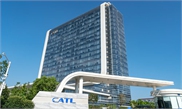
A view of CATL headquarters in Ningde, East China's Fujian Province Photo: VCG
Thanks to China's rapid growth in electric vehicles (EVs), the world's largest manufacturer of batteries for EVs - Contemporary Amperex Technology (CATL) - has produced nine billionaires, with the number of the mega-rich surpassing that for tech giants such as Google and Facebook, according to Forbes.
The real-time net worth of Robin Zeng Yuqun, founder and chairman of Fujian Province-based CATL, ranks 41st worldwide with $34.5 billion as of Wednesday. The nine executives and investors of CATL have a combined fortune of $72 billion.
Forbes' real-time billionaires list tracks the net worth of the world's richest people.
Over the past year, the shares of CATL have skyrocketed by more than 150 percent at the Shenzhen Stock Exchange. On January 7, the shares rose to as high as 413.2 yuan ($63.83), sending its market capitalization to 980 billion yuan.
These achievements by CATL, founded in 2011, which supplies Tesla, BMW, Volkswagen and Geely, is closely connected with China's EV boom. The country has long been pushing developments in the green economy with an ambitious goal to reach carbon neutrality by 2060.
According to Forbes, "roughly two-thirds of the clean energy billionaires hail from China."
In addition to the nouveau riches from CATL, China also has EV billionaires like Nio's founder and CEO William Li ($5.8 billion) and Xpeng's CEO He Xiaopeng ($5.5 billion).
As the epitome of China's EV industry, the miracle of CATL is expected to continue as long as the Chinese car market adopts EVs as the main development direction, Feng Shiming, a car analyst, told the Global Times on Wednesday.
"That means that the dominance position of CATL as a corporate champion in the EV battery industry are unlikely to alter," Feng noted.
However, he pointed out that China's EV industry is still at an "early stage of adolescence" - growing fast but having some problems. For instance, some EVs have reportedly caught fire running on road.
Looking further, Feng foresees diversified competition in the EV industry, instead of being monopolized by one particular company. "These companies will have their own developments, leading the market to be more balanced."
According to market tracker firm Canalys, China's EV sales are expected to grow by more than 50 percent this year. That will help car component suppliers reap hefty benefits from a strong demand for electric cars.


